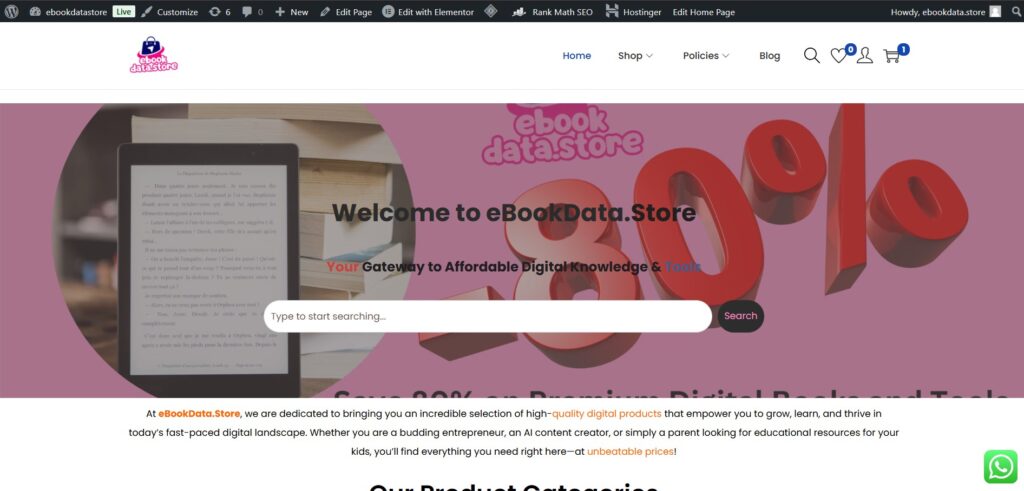In today’s fast-paced world, access to literature has never been more critical. With the rise of digital technology, readers can now enjoy their favorite titles without breaking the bank. One platform that stands out in this regard is the Ebook Data Store, where you can find a vast selection of digital books at unbeatable prices.
Overview of Ebook Data Store

Ebook Data Store is an innovative platform dedicated to providing readers with access to a wide range of digital books. The website is designed with user experience in mind, making it easy for visitors to navigate through various categories and find exactly what they’re looking for.
Products Available
One of the most appealing aspects of Ebook Data Store is its pricing strategy. All products are available for just ₹599 or under $7, making it an incredibly affordable option compared to other platforms like Amazon, where similar titles can cost upwards of $40. This pricing model not only makes reading accessible but also encourages more people to dive into literature without financial strain.
Benefits of Choosing Ebook Data Store
Choosing Ebook Data Store means opting for affordability, accessibility, and variety:
- Affordability: All products are priced at ₹599 or less, so you can build your digital library without overspending.
- Accessibility: Once you purchase a book, it can be downloaded instantly, allowing you to start reading immediately.
- Variety: The platform offers a diverse range of genres and titles, ensuring that there’s something for every reader’s taste.
How to Purchase and Download Digital Books
Purchasing from the Ebook Data Store is straightforward:
- Visit the shop page at Ebook Data Store Shop.
- Browse through the categories or use the search function to find specific titles.
- Add your chosen books to your cart and proceed to checkout.
- After payment confirmation, you’ll receive a link to download the digital books you purchased.
If you encounter any issues during downloading, the Ebook Data Store provides WhatsApp support to assist you promptly.
Additional Resources
In addition to affordable digital books, the Ebook Data Store also offers various free resources:
- You can find options for free books online, including classics available through platforms like Librivox.
- The site occasionally features free PDFs, allowing readers to sample new titles before committing to a purchase.
Related Keywords and Their Importance
When exploring digital literature, several keywords can enhance your search experience:
- Digital book
- Digital book free
- Digital book maker
These keywords are essential in helping readers locate relevant content quickly. Incorporating them into your searches will yield better results when looking for specific types of literature or resources.
Customer Support and Policies
Ebook Data Store takes customer satisfaction seriously. If you have any questions or encounter issues while downloading your purchases, their WhatsApp support team is ready to assist you. Additionally, it’s crucial to read through their terms and conditions and return policy before making any purchases.
Conclusion
In summary, the Ebook Data Store offers an unparalleled opportunity for readers seeking affordable access to a wide range of digital books. With prices starting at just ₹599 or under $7, it’s an excellent choice for anyone looking to expand their literary horizons without overspending.
So why wait? Visit the Ebook Data Store today, explore their extensive collection, and download your next favorite read! This article outline provides a comprehensive structure that covers all necessary aspects while strategically incorporating your main keyword “digital books” and related keywords throughout the content as requested.
What makes eBookData.store’s pricing competitive compared to Amazon

eBookData.store‘s pricing is competitive compared to Amazon for several reasons:
- Flat Pricing Structure: eBookData.store offers all its digital books at a flat rate of ₹599 (approximately $7), significantly lower than many titles on Amazon, which can often exceed $40. This straightforward pricing eliminates confusion and provides customers with a clear value proposition.
- Affordability: The pricing strategy at eBookData.store makes it an attractive option for budget-conscious consumers. In contrast, Amazon’s pricing can vary widely based on factors such as the book’s popularity, author, and market demand. Many eBooks on Amazon are priced between $9.99 and $14.99, making eBookData.store a more economical choice for readers looking for similar content at a fraction of the cost 13.
- Comparison with Amazon’s Pricing Strategies: Amazon employs dynamic pricing strategies that can lead to higher prices for certain eBooks, particularly bestsellers or new releases. This often results in prices that are not only higher but also fluctuate regularly 67. In contrast, eBookData.store maintains consistent pricing across its catalog, which can be more appealing to consumers seeking predictable costs.
- Value Proposition: While Amazon provides a vast selection of titles, many customers may find that the high prices do not correlate with added value, especially when they can access similar content for less on eBookData.store. The focus on affordability without sacrificing quality makes eBookData.store an attractive alternative.
- Access to Free Resources: eBookData.store also offers free resources and samples, which can enhance the overall customer experience and encourage purchases. This is an additional incentive that may not be as prevalent on Amazon, where free offerings are limited 14.
- Targeted Market: eBookData.store appears to target a specific audience looking for affordable digital books, which may not be the primary focus of Amazon’s broader market strategy that includes various product categories beyond books 25.
In summary, eBookData.store’s competitive pricing stems from its flat-rate model, affordability, consistent pricing strategy compared to Amazon’s dynamic approach, and added value through free resources and targeted offerings.
eBookData.store’s pricing strategy differs from Amazon’s in several key ways:
eBookData.store’s pricing strategy differs from Amazon’s in several key ways:
- Flat Rate Pricing: eBookData.store offers all digital books at a consistent price of ₹599 (approximately $7), which simplifies the purchasing decision for customers. In contrast, Amazon employs a dynamic pricing model where eBook prices can vary significantly based on factors like demand, author popularity, and promotional strategies. This can lead to prices ranging from as low as $0.99 to over $40 for certain titles, creating uncertainty for consumers about the best time to buy.
- Affordability: The flat pricing at eBookData.store makes it a more affordable option for readers, especially when compared to Amazon’s higher-priced offerings. Many eBooks on Amazon are priced between $9.99 and $14.99, making eBookData.store’s pricing is a compelling alternative for budget-conscious consumers looking for similar content at a lower cost [1][4].
- Simplified Royalty Structure: Authors on Amazon can choose between a 35% or 70% royalty option depending on their pricing strategy. This complexity can lead to higher prices for consumers as authors may price their books higher to ensure they receive adequate royalties [1]. In contrast, eBookData.store’s straightforward pricing does not involve such complexities, allowing for lower consumer prices without sacrificing author earnings.
- Loss-Leader Strategy: Amazon often uses a loss-leader strategy by pricing some popular eBooks below wholesale cost to attract customers and drive traffic to its platform [2]. While this can be effective for customer acquisition, it can also result in fluctuating prices that may confuse consumers. eBookData.store does not engage in such strategies; instead, they opt for consistent pricing that enhances customer trust.
- Focus on Digital Books: eBookData.store specializes in digital books, positioning itself as an affordable alternative specifically for readers seeking electronic literature. Amazon, while offering a vast array of products including physical books and other goods, may not prioritize competitive pricing in the digital book segment as much as eBookData.store does [3][4].
- Free Resources and Promotions: eBookData.store occasionally provides free resources and promotional offers that encourage readers to explore their catalog without financial commitment. While Amazon also offers free promotions through its Kindle Direct Publishing (KDP) program, these are often limited in scope and duration [1]. eBookData.store’s approach may foster greater customer loyalty by providing ongoing value.
In summary, eBookData.store’s competitive edge lies in its flat-rate pricing model, affordability, simplified royalty structure for authors, consistent pricing strategy without loss-leader tactics, focused offerings in digital books, and additional free resources that enhance the customer experience compared to Amazon’s more complex and variable pricing strategies.
Citations:
[1] https://www.writehacked.com/writing/the-definitive-guide-to-ebook-pricing/
[2] https://host.kelley.iu.edu/mwildenb/ebooks.pdf
[3] https://www.scottmarlowe.com/post/A-comparison-of-eBook-prices-vs-paperbacks
[4] https://economictimes.indiatimes.com/tech/hardware/ebooks-9-99-problem-how-apples-deal-with-worlds-top-publishers-created-problems-for-amazon/articleshow/12913948.cms
[5] https://onlinelibrary.wiley.com/doi/10.1155/2021/2058960
[6] https://www.idealog.com/blog/if-amazon-pricing-of-ebooks-is-the-problem-is-agency-actually-the-right-solution/
[7] https://www.intelligencenode.com/blog/amazon-pricing-strategies-model/
[8] https://sellbery.com/blog/amazon-pricing-strategy-ultimate-guide/
How does eBookData?store’s pricing strategy affects the author’s earnings

eBookData.store’s pricing strategy can positively affect author earnings in several ways compared to traditional platforms like Amazon:
- Consistent Revenue per Sale: eBookData.store offers a flat pricing model where all digital books are priced at ₹599 (around $7). This consistency means that authors can expect a stable income per sale, unlike Amazon, where royalties vary based on price points. For instance, Amazon pays 70% royalties for eBooks priced between $2.99 and $9.99 but only 35% for those priced below $2.99 3. This can lead to lower earnings for authors who price their books at the lower end of the spectrum.
- Higher Sales Volume Potential: The competitive pricing at eBookData.store may attract more price-sensitive readers, potentially leading to higher sales volumes. Authors might benefit from increased exposure and sales, especially if their books are priced significantly lower than similar titles on Amazon, which can often exceed $40 12.
- Reduced Competition Pressure: On platforms like Amazon, authors often face intense competition, which can drive prices down and make it challenging to maintain profitability. eBookData.store’s focused niche on affordable digital books allows authors to compete more effectively without the pressure of underpricing their work to attract buyers.
- Simplified Marketing Strategies: With a clear and consistent price point, authors can develop straightforward marketing strategies that highlight affordability as a key selling point. This contrasts with the need for complex promotional pricing strategies on Amazon, where authors must navigate various pricing tiers and promotional deals 4.
- Potential for Building a Loyal Reader Base: By offering affordable digital books, eBookData.store may help authors build a loyal readership more quickly. Readers who find value in affordable offerings are likely to return for future purchases, increasing long-term earnings potential for authors.
- Less Reliance on Promotions: Many authors on Amazon rely heavily on promotional pricing to boost visibility and sales, which can lead to fluctuating earnings 5. In contrast, eBookData.store’s stable pricing reduces the need for constant promotions, allowing authors to focus on creating quality content rather than engaging in frequent discounting.
In summary, eBookData.store’s pricing strategy can enhance author earnings by providing consistent revenue per sale, attracting price-sensitive readers, reducing competitive pressure, simplifying marketing efforts, fostering reader loyalty, and minimizing reliance on promotions compared to traditional platforms like Amazon.
